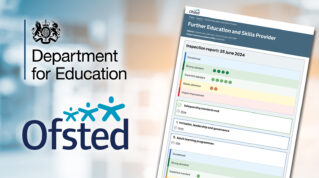Having recently left the Department for Education, I am now amazed every morning at the speed Windows logs in when you don’t have to get through a VPN designed to check civil servants are suitably proximate to a Pret a Manger and not staring into their fridges at home. But I used to take a mitigating moment of pride seeing the one bit of the DfE corporate background still peeking out through all the files I’d saved chaotically to my desktop: “Put learners and children first.”
It’s the calling that unites everyone who works with young people, and since moving to the National Youth Agency and talking every day to youth workers across the country, I’ve felt at home because – just like FE teachers – what they want to talk about are the young people they work with, the innovative ways they are engaging them and what more they wish they could be doing.
No teacher or youth worker ever found themselves in their underpaid vocations because they wanted to do the bidding of imagined ‘employers’, yet somehow the sensible awareness of employability as one aspect of education and progression has become an excessive focus of how we evaluate the experience of FE.
I’ve started counting mentions of employability, employers, employment etc in Ofsted inspection reports. The average in the last ten FE college inspections (as of early February) was fourteen mentions per report. In contrast, mentions of student wellbeing averaged less than once per report. Whimsically, I even looked for mentions of students’ happiness. Bravo to North Hertfordshire College for achieving the lone mention of happiness across ten recent inspections.
The 2022 introduction of the local skills statement in college Ofsted reports formalised the industrialist grip on college curricula. The unspoken inconsistency is that school sixth forms are subject to no such requirement. Most inspections of schools with sixth forms don’t mention employers at all. The overbearing need to have line of sight between classroom and income-tax contribution only applies when thinking about other people’s children.
FE misses out on being celebrated for its excellent work
This means FE misses out on a chance to be celebrated for the excellent work it does in supporting student mental health and wellbeing, and that its direct link to employability is overlooked. We know that anxiety and depression increase young people’s chances of not engaging with employment. No matter how well you align your curriculum with local skills needs, it’s not going to make a difference if your attendance is through the floor.
Finding a happier balance between employability and wellbeing in Ofsted reporting doesn’t require major changes to inspection. It just requires better use of the existing personal development judgment, which lags so far behind the skills statement in terms of word count that it has almost disappeared.
The inspection handbook notes that personal outcomes may not emerge until much further on in young people’s lives, so directs inspectors to look at quality and intent. This sounds great, but then a series of prescriptive bullet points about British Values and sex education lead to many reports reading as, “learners are taught about radicalisation and sexual consent: job done.”
The approach to personal development would do well to draw from the professional practices of youth work, where similarly the ‘outcome’ cannot be prescribed. The process of youth work is centred on the young person and their needs, rather than a dictated syllabus. The NYA’s National Youth Work Curriculum is built around the cornerstones of Education, Empowerment, Equality, and Participation.
Rather than asking whether radicalisation has been taught, “tick”, ask whether the young people have influence over issues that concern them and are engaging with democratic processes.
Rather than ask if healthy relationships have been taught, “tick”, look for the signs of respect in the connections young people are making.
That would offer far more opportunity for the things I love best about FE to get the credit they deserve: exemplary student voice, fierce tolerance and incredible diversity of learning.
At our core we want to put learners first. Of course seeking employers’ views is important – and that shouldn’t be limited to just colleges – but let’s elevate the voices of our young people and ask them, “Are you happy?”















I’m not convinced the phrase ‘fierce tolerance’ is going to make it onto the buzzword bingo scorecard.
It’s a little too nebulously specific.